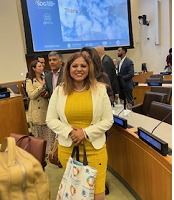Facing time in prison for her role in the nation’s largest college admissions scandal, actress Felicity Huffman grew tearful, her voice breaking as she told a courtroom that she wished she had never taken part in a scheme to inflate her daughter’s SAT score. Earlier, she sat silent and stoic as a prosecutor ticked off all the reasons probation would not be sufficient punishment.
In the end, a federal judge in Boston sentenced Huffman to 14 days in a federal prison Friday. She was the first parent to face punishment in a scheme in which nearly three dozen wealthy people are accused of using lies and bribes to smooth their children’s way into prestigious colleges.
Looming over Huffman’s sentencing were questions about fairness, and whether she and the other mostly white parents in the case would be treated more leniently than poor or non-white defendants accused of educational fraud. The issues were emerging in a case that has been seeped with questions of inequity — and well-to-do parents’ efforts not just to guard their advantages but to grab more.
The judge’s decision to impose a prison sentence on Huffman, whom prosecutors saw as one of the least culpable parents, made it more likely that any parents convicted in the case will face at least some prison time, even if the period is brief and largely symbolic.
In arguing that the parents in this case should go to prison, prosecutors had pointed to examples of defendants like Kelley Williams-Bolar, an African American single mother in Akron, Ohio, who was sentenced to five years in prison — a sentence later suspended to 10 days in jail, three years of probation and community service — for using her father’s address to get her children into a nearby suburban school district. They also pointed to a group of black public schoolteachers, principals and administrators in Atlanta, who were convicted in a conspiracy to cheat on state tests, some of whom were sentenced to as much as three years in prison.
“If a poor single mom from Akron who is actually trying to provide a better education for her kids goes to jail, there is no reason that a wealthy, privileged mother with all the legal means available to her should avoid that same fate,” Eric S Rosen, the lead prosecutor in the case, said in court.
“If we believe in just punishment,” he added, “we should not put the Williams-Bolars in jail while letting the Huffmans go free.”
Huffman’s lawyer, Martin Murphy, argued that most comparable defendants were given probation rather than prison. And he said that, just as Huffman’s wealth and fame should not lead the judge to impose a lighter sentence, they should not lead her to impose a longer one, either. He had argued in a sentencing memorandum that a term of imprisonment was not needed as a deterrent in Huffman’s case because she had already suffered considerably, by being publicly shamed, seeing her acting career crater and facing the anger of both her daughters.
“It can’t be the case that Huffman should be treated more harshly because of her financial circumstances and her notoriety,” he said.
Huffman, who had pleaded guilty to one count of conspiracy to commit mail fraud and honest services mail fraud, a felony, addressed Judge Indira Talwani on Friday. She read from notes and frequently choked up as she said how deeply she regretted taking part in the cheating scheme in which she paid $15,000 to inflate her daughter’s test score.
She recalled driving to the school where her daughter was to take the SAT and — afterward and unbeknown to her daughter — where a proctor planned to illicitly correct the answers. At one point along the drive, as her daughter asked whether they could get ice cream after the test, Huffman remembered having second thoughts about her plan. She told the court, “I thought to myself, ‘Turn around, turn around, turn around.’” She paused as she choked back tears. “To my eternal shame,” she said, “I didn’t.”
She said that when she was later arrested and had to explain to her daughter what she had done, “She said to me, ‘I don’t know who you are anymore, Mom.’”
“I realise now with my mothering that love and truth must go hand in hand,” she told the judge, “and that my love coming at the expense of truth is not real love.”
Talwani also imposed a $30,000 fine, supervised release for a year and 250 hours of community service. Huffman was ordered to report in six weeks to a federal Bureau of Prisons facility that has yet to be chosen.
In a statement released by a spokesman after the hearing, Huffman said: “I accept the court’s decision today without reservation. I have always been prepared to accept whatever punishment Judge Talwani imposed. I broke the law. I have admitted that, and I pleaded guilty to this crime. There are no excuses or justifications for my actions. Period.”
Prosecutors have charged 51 people in the expansive admissions case, including coaches and others, and 15 of the 34 parents charged have pleaded guilty. In the cases of some other parents who have pleaded guilty, prosecutors are seeking as much as 15 months of incarceration.
They asked for a comparatively lighter sentence — one month — for Huffman in part, they said, because she paid less than many of the other parents and because she chose not to include her younger daughter in the scheme. Besides the cheating on tests, some parents are accused of conspiring to bribe college coaches to pass their children off as athletic recruits in sports they often did not play.
Huffman was not the only Hollywood celebrity charged in the case. Actress Lori Loughlin is accused of conspiring to use bribes to get her daughters admitted to the University of Southern California as recruits to the women’s crew team. She has pleaded not guilty.
Prosecutors had raised the cases of Williams-Bolar, the black mother from Ohio, and the Atlanta educators, to argue that fairness required sentencing Huffman and the other parents in this case to at least some period of incarceration.
But some defence lawyers involved in those cases questioned that logic.
David Singleton, executive director of the Ohio Justice and Policy Centre, who represented Williams-Bolar in successfully seeking clemency in her case, said that there were indeed disparities in the justice system.
“When you are rich — and particularly if you’re rich and white in this country — there’s a different justice system,” he said. But, he added, “Sending Felicity Huffman to jail is not going to solve that problem.”
Similarly, lawyers who represented educators charged in the Atlanta test cheating scandal said that the sentences given to some of the defendants in that case were excessive.
“Our educators in our cheating scandal in Atlanta were way over-prosecuted and way over-punished,” said Bob Rubin, who represents Dana Evans, a former principal, who was convicted of a racketeering charge and of making a false statement to a Georgia Bureau of Investigation agent. Evans was sentenced to one year in prison; her case is on appeal.
“My answer is not to give Felicity Huffman more but to give our clients less,” Rubin said.
Issues of equity seemed to be very much on Talwani’s mind.
She told Huffman that what had outraged people about the admissions scandal was not the revelation that something that was supposed to be a meritocracy was not really one. Everyone already knew that the admissions system was distorted by money and privilege, she said, with wealthy students having numerous advantages over poor ones, including better academic preparation, individualised tutoring and college counselling, access to fancy internships, and basics like food and stable housing.
People’s outrage, she told Huffman in the crowded courtroom, was “that in a system of that sort, in that context, that you took the step of obtaining one more advantage to put your child ahead of theirs.”
She suggested to Huffman that, in imposing a sentence, she was clearing the slate for her.
After serving her time, she said, Huffman could move forward and rebuild her life.
“After this, you’ve paid your dues,” she said. “I think without this sentence you would be looking at a future with the community around you asking why you had gotten away with this.”






















